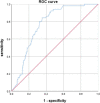Prolonged antibiotic therapy increased necrotizing enterocolitis in very low birth weight infants without culture-proven sepsis
- PMID: 36147802
- PMCID: PMC9485444
- DOI: 10.3389/fped.2022.949830
Prolonged antibiotic therapy increased necrotizing enterocolitis in very low birth weight infants without culture-proven sepsis
Abstract
Objectives: We aimed to identify the factors associated with necrotizing enterocolitis (NEC) and to assess the associations of the initial empirical antibiotic therapy (IEAT) duration and antibiotic therapy duration/hospital stay ratio (A/H ratio) before NEC with subsequent NEC in very low birth weight (VLBW) infants with gestational age less than 32 weeks without proven sepsis.
Methods: A retrospective study was conducted at the NICU of the First Affiliated Hospital of Medical University of Anhui province from June 2015 to May 2022, and 567 VLBW infants with gestational age less than 32 weeks were included in the study. We divided the VLBW infants into those with and without NEC according to modified Bell's criteria. We then used descriptive statistics to identify the factors associated with NEC and multivariate analyses to evaluate the associations of IEAT duration and A/H ratio with the occurrence of NEC.
Results: Of the 567 VLBW neonates admitted to our center, 547 survived and reached the normal discharge criteria. Fifty-one infants (8.99%) were diagnosed as showing NEC. Infants with NEC had a longer total parenteral nutrition time, total enteral nutrition time, and IEAT duration, as well as a higher A/H ratio than those without NEC. In multivariate analyses adjusted for the other factors, IEAT duration was associated with an increased odds of NEC [odds ratio (OR) = 1.267; 95% confidence interval (CI), 1.128-1.423], and the A/H ratio was also associated with increased odds of NEC (OR = 8.718; 95% CI, 2.450-31.030). For the A/H ratio, the area under the curve (AUC) was 0.767 and the ideal cutoff was 0.357, and the sensitivity and specificity were 0.843 and 0.645, respectively.
Conclusion: Prolonged antibiotic therapy may increase the risk of NEC in VLBW infants with a gestational age of fewer than 32 weeks and should be used with caution.
Keywords: antibiotic use duration; hospital stays; initial empirical antibiotic therapy; necrotizing enterocolitis; very low birth weight (VLBW).
Copyright © 2022 Zhu, Gao, Yuan, Wang and Deng.
Conflict of interest statement
The authors declare that the research was conducted in the absence of any commercial or financial relationships that could be construed as a potential conflict of interest.
References
-
- Cotton CM, Taylor S, Stoll B, Goldberg RN, Hansen NI, Sánchez PJ, et al. Prolonged duration of initial empirical antibiotic treatment is associated with increased rates of necrotizing enterocolitis and death for extremely low birth weight infants. Pediatrics. (2009) 123:58–66. 10.1542/peds.2007-3423 - DOI - PMC - PubMed
LinkOut - more resources
Full Text Sources


